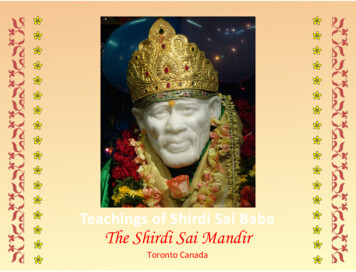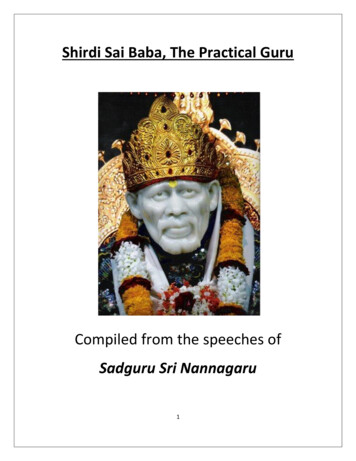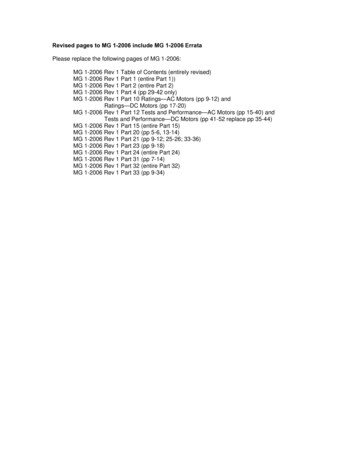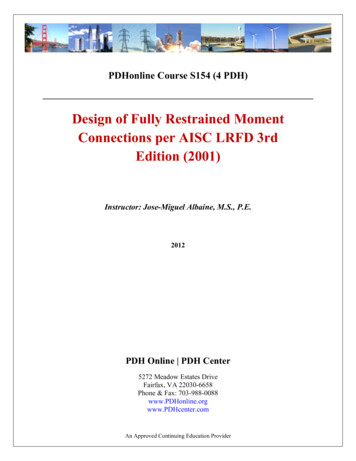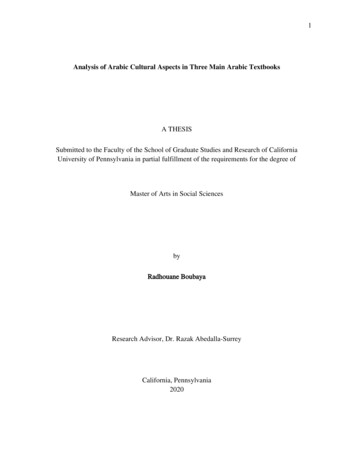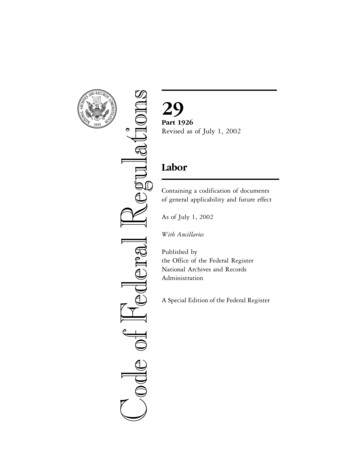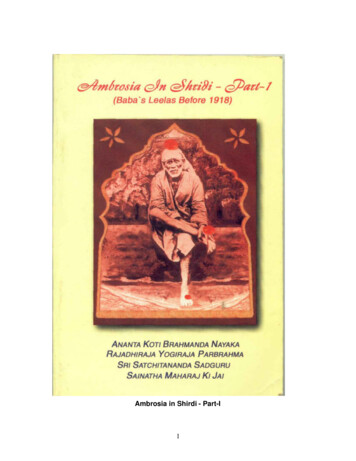
Transcription
Ambrosia in Shirdi - Part-I1
(Baba's Leelas before 1918)If any devotee wishes to use this material in any formPlease contact:VINNY CHITLURI, 304,Bhagchand Apartments,Pimpalwadi Road,Shirdi -423109 Phone: 02423-55835First Publication: July,2002Published by SADA S. GODESri Sai Baba Mandir, KorhaleTaluq: Rahata, M.S., IndiaPrice: Rs.70/All the proceeds from this book will be donated to Sri Sai Baba Mandir,KorhalePrinted by: MHATRE OFFSET, MUMBAIDedicationTo My lovely sisters,The good karmas of my previous lives gave me my eldest sister, AshalataMital “Mother Her” is what we called her when we were young. She is more thana mother to me, my mentor and guide. She encouraged me in ways, toonumerous to mention.Thank you Asha for being you.To Brinda Dutta “Bee” who told me to go for it and taught me to be me andstood by me through thick and thin.Thank you BeeI don’t know where I would be without both of you. Please accept myhumble dedication.ACKNOWLEDGEMENTSWith a heart bursting with gratitude, I humbly lay this book at the Holy feetof "The Parabrahma Sri Sat-Chit-Anand, Sadguru Sai Nath Maharaj'. Thank you2
'Ambrosia' (Baba), for giving me this opportunity, for ' not a leaf moves withoutthy consent'.My heartfelt gratitude to my guardian angels M. Bose and Sada S. Codefor helping me in ways unimagenable.I am truly indebted to the descendents of Baba's 'Ankita Bhaktas' forallowing us into their homes, and giving us material, and allowing us to takephotographs.From Harda;Raju Parulkar and Govind Naik.From Indore :Viswanath and Vanita Naik.From Mumbai:Virendra Tarkad, Manohar Pithale, Anil Dixit, Sai Nath Gawankar,V. Pradhan, Anuradha Tarkad and the Borkar family.May Baba shower His grace on you and your family.My countless thanks to the printersMy Family GuruB. V. Narasimha Swamiji 21st August 1874 - 19th October 19563
Sai Bhakta VinnyFounder, All India Sai Samaj, MadrasA WORD ABOUT THE COMPILERI was born in 1943 in Arvankadu (Nilgiris), the youngest of the fourchildren. My father was a hardcore atheist, while my grandmother was a gentledevout lady. Ever since I was young, my mother was forever sick, often atdeath's door. My father took her from one doctor to another. At last, she wasadmitted in the Vellore Medical Hospital. To make a very long story short, afterabdominal surgery, many tests and many consulta tions, they too gave up, andasked my father to take her home.One day, my father read in 'The Hindu' that H.H.Narsimha Swamiji wascoming to the Naga Sai temple, Coimbatore. The paper also gave a glowing account of Swamiji's divine nature and how He healed so many people. My fatherdecided to take my mother to Him. Thankfully, they took me too. This was in1949, The day before the meeting, my mother had a dream. She saw this 'gentlebearded man' with lots and lots of devotees around Him, seated in a palanquin.He was wearing a short Flannel gray kafni or kurta. She told my father about hervivid dream, not knowing that she was to meet Him the next day.Swamiji asked my father, what did he want - a promotion, wealth, childrenor fame." My father pointed to my mother and said, "She is terribly sick. Pleaseheal her. I can always find another wife, but not a mother for my kids." Swamijiasked Dr. Chari to check her pulse, which was irregular and erratic. Then Heplaced His palm on her head. My mother shivered and said," It is ice cold." He again placed his palm on her head and said, "Nowwhat?" My mother was filled with warmth, and at once held His hand sayi ng,'Aha'. He then gave her Baba's Udi and a sthothra, " Achuta, Ananta, Govinda."He asked her to say it 21 times for 21 days. He had also told her to apply Udi andtake it internally with water.While all this was happening, I was standing near the door looking at thisgentle bearded man. I thought this must be Santa Claus. I had an irresistible urge4
to pull His beard. He beckoned me to come near. He then picked me and mademe sit on His lap. The feeling was so good that I laid my head on His chest andpatted His beard. He then placed His hand on my head and blessed me.Of course, by His and Baba's grace, my mother recovered fully and myfather became a Baba bhakta. Sometime later, we went to Madras to thank Him.Swamiji said, "I've done nothing. It is Baba's Udi and grace that has worked. Sothank Him and pray to Him. By the way, Prabhu, go to Central India and doBaba's prachar." He then gave my father Udi with a photograph of Baba. Myfather wondered at His words but sometime, later, we were transferred toKhamaria, Jabalpur, Madhya Pradesh. There, we started doing Thursdaypoojas. Later, my father got a Baba temple built. Often, my father used to remindus of Swamiji's words, telling us that even a mustard seed of Baba's Prachar andSeva adds up. He, on his part, visited Shirdi, wrote prolifically on Baba and heldSatsangs.I finished my studies and joined the Jabalpur Medical College. Once, in1963, we visited Shirdi. At that time, the Sai Nath Hospital was being built. Ivowed to do Seva (free service) there. After graduating, I did my Post Graduationin Kalavathi Saran Hospital, Delhi and later went to USA. In the US, I did myBoards in Paediatrics and was very successful. By then, I had forgotten my vow,as the years rolled by. But a little voice kept asking me whether "All this wasnecessary". My father's words kept haunting me. I kept pushing them aside, butthe voice persisted. At the height of my career, I decided to give it up, and comeand live in Shirdi, Baba willing. From 1994, I stayed i n Shirdi.One day, I took some photographs of Baba's Bhaktas whom I love verymuch. When Bose Anna saw them, he said, "Why can't we have a photoexhibition with printed matter?" That started it all. From that time, I have notlooked back.5
Govind R. Dabholkar (Hemad Pant) ( 1856- 1929)Ambrosia in Shirdi Part-I The IntroductionThe year 1910 is written in gold on the heart of every Baba devotee; forthat was the year that Dabholkar visited Shirdi. He saw Baba grinding wheat,only to throw it at the village boundary, to stop the cholera epidemic. His curiositywas aroused, and he wished with all his heart to write the 'Satya Charitamrit' ofBaba's life. He sought permission and it was granted. "You have my fullconsent to write My life. Take notes and keep them. If My Leelas arerecorded, sins commited through ignorance will be dissolved when theseare heard and or read with love and devotion, the cares and troubles ofworldly life will be forgotten," said Baba.6
So, Dabholkar set about, writing, hearing and seeing the leelas of HisGuru. With keen interest, love, devotion and humility, he kept a record of them.He actually started writing 'The Pothi' in 1922; and it was published in 1929 afterhe took samadhi. The Marathi Pothi is written Ovi Meter, like Eknath's Bhagwat.It is usually sung rather than read. The fantastic task was done during SadguruSainath's sojourn on earth, and with His consent. This fascinating book is a Bibleor Koran for every Baba devotee. So great is its power, that many a Leela, cure,wish and material benefit has been affected. The Phalastuti given at the end hasbeen accomplished and much more.Spiritual enlightenment and progress has been achieved. In short, if thereis one Pothi that anybody needs, it is the Sai Satcharitra. It is a must in everyhouse. It has fifty-three chapters and nine thousand, three hundred and nineverses and many pages. It wasn't possible for Dabholkar to write each and everyLeela, it would have been in many volumes.Here are some of the Leelas that occurred before 1918, that haven't beenmentioned in 'the Pothi'. I humbly lay them primarily at the feet of SadguruSainath for His blessings. With utmost humility, I also beseech Dabholkar tobless this earnest venture. As far as possible, complete names and dates arementioned. It is my honest hope, that these Leelas will augment those given inthe Satcharitra.Ambrosia in Shirdi Part-1Leela 1"/ may be here in My physical body, and you may be far away beyondthe seven seas. Yet, whatever you do there I know instantly. Wherever youmay be, when you spread your hands before Me in supplication with faithand devotion, there I stand behind you day and night, as steadfast as yourfaith and devotion is," said Baba to Cholkar (Sai Satcharitra Ch.15).Baba's words are true for each and every bhakta (devotee) even now; asthey were then. This is such a Leela where Baba literally went beyond the sevenseas to rescue a bhakta.7
It was during World War I; Capt. Jahanghir F. Daruwala was at sea, withhis fleet of ships. To his utter dismay he realized that all but three of his shipswere hit by the enemy and were sinking fast. Soon these three ships with thepassengers, and himself would meet the same fate. Being a good Captain hehoped to ferry the remaining ships to safety.He had Baba's photograph in his pocket. He promptly took it out andearnestly prayed to Baba to come to their rescue. Just as he has praying, Babasitting in the Dwarkamai shouted "Haq, haq". The devotees surrounding Baba,were astonished to see Baba completely drenched, from head to toe. The waterflowed in torrents, and the Dwarkamai soon became a pool of water. Thedevotees simply removed buckets and buckets of water from the Dwarkamai forabout an hour. Then they gave Baba dry clothes to wear.As Baba was silent about the cause of His being drenched, one of thedevotees drank the water as tirth (holy water) and found it extremely salty. Hewondered at that, but kept quiet. Simultaneously, at sea, Capt. Daruwala sawBaba in person, pull and tow his ships to safety. On the third day after thisincident Baba received a telegram from the Captain, thanking Him for the rescueoperation. Immediately on his return he came to Shirdi and fell at Baba's feet. Hethanked Baba for answering his prayers so swiftly and saving the lives of hiscrew and the passengers. Capt. Daruwala was an ardent devotee and he took agreat deal of interest in Baba's affairs. He donated Rs.2,200/- in two installmentsfor the repair of the Sabha Mandap. As a small 'thank you gesture1.Leela 2Rama Krishna G. Kothari was born in 1908. He was a Pathari Prabhu bycaste. His parents first visited Shirdi in 1911. On that visit, they saw Babastanding near the railing (Kathada) of Dwarakamai, distributing Udi to theBhaktas. They were filled with devotion, and were overwhelmed with the love, tosee this beautiful sight. Upon their return home, they started worshipping aphotograph of Baba (it was a print of Jaykar's painting). They also started doingBhajans and called the Bhajan Mandali (group) ‘Sai Laj'.8
In 1913 his father was seriously sick with pneumonia. Dr. Naik wastreating him, but was skeptical of his recovery. He told the family that thechances of recovery were slim, and he would succumb to the disease. Hearingthis his mother prayed to Baba and vowed that if her husband survived, shewould do 'Padyatra' (walk) to Shirdi and thank Baba.The Bhajan Mandali also came to his home to perform the Bhajans(hymns), the whole night. At nightfall the disease took a serious turn, the doctorwas summoned at 10.00 P.M. He gave the patient an injection and medicines buttold the wife that at about 12.00 P.M. her husband would die. The relatives onhearing this, read the Bhagwat Gita to the patient. Simultaneously Baba'sBhajans conti nued. At about 11.00 P.M. the patient started to suffocate, and hadgreat difficulty in breathing. The distort wife seeing his condition wailed and criedsaying 'Baba save my husband'. The crisis lasted till 1.00 A.M. when the doctorwas called again. He again gave the patient an injection, but assured them thatthe crisis was over.The Bhajans continued till 4.00 A.M. when the Bhajan Mandali and therelatives assured the wife that her husband had survived. So she better getready, for the 'Padyatra' (pilgrimage by foot) as per her vow. From that time thepatient steadily recovered, and was ambulant in a few moments. So the familyand the Bhajan Mandali started for Shirdi. At Kopargaon, the family hired fivebullock carts to take them to Shirdi. But the wife would not sit in the cart. She justwalked, behind the carts although her legs were swollen and bruised.A short distance from Shirdi there was a stony, and thorny path. So shewent and rested under a tree. She noticed a man with a white beard in ashepherd's dress. He approached her and said, "Your vow has been accepted byBaba so mother, go the rest of the distance by bullock cart".The lady heard the loving tone in the voice but she adhered to her vow,and trudged the rest of the way. When she reached Dwarkamai, Baba wasseated with His devotees when Baba said to Nana Saheb, "/ met this lady onthe way and told her to ride in the cart, but she would not listen. See how9
swollen and bruised her legs are! But they will be alright by the evening."True to His word the swelling and the bruises vanished by evening.They stayed at Shirdi for a few days and returned home with Baba'sblessings and Udi.Leela 3"I forgot my vow to Baba," thought Govinda Rao Garde of Nagpur. Herecalled, how his nephew was suffering from some disease when he visited him.At that time, Govinda Rao vowed that if his nephew recovered, he would sendhim to Shirdi for Baba's darshan. The nephew did recover in two days. But heforgot his vow, although his nephew visited him three times, hoping that he wouldremember, after seeing him hale and hearty.Some time later, the nephew visited his uncle only to find that he was sickwith the same disease. Since it was a Thursday, all the family members gatheredtogether and prayed and sang Bhaja ns. They entreated Baba for his recovery.That day, he was well enough to attend the pooja (worship) when he wasreminded of his vow.He vowed again saying, "Baba if you cure me, I and my nephew will comefor your darshan." He found that he recovered quickly and hurriedly went with hisnephew to Shirdi to thank Baba.In Sai Satcharitra Ch.36 describes the story of two gentlemen from Goaand their fulfillment of their vows.Leela 4.Govinda Rao Oak lived in Andheri, Bombay. Once he and his friend,Krishanji Agasthe went to Shirdi. They had Baba's darshan and stayed for two tothree days. On the day of their departure, both of them pur chased a photographof Baba. Neatly they tied the pho tographs in a bundle. On the way home,Govinda Rao was remiss, as he had not purchased a photograph for his brother.On reaching home, they opened the packet containing the photographs. To theirutter surprise there were three photographs although they had paid for two.Mentally, he thanked Baba for this Leela and gave his brother one copy asBaba's prasad.10
Leela 5At every opportunity, Chidambar R.K. Gadgil visited Shirdi for Baba'sdarshan. This was easy at first, as he was the Personal Assistant to the Collectorof Ahmadnagar district. Then he worked as a Mamlatdar in Sinnar. Time andagain he came to Shirdi and took Baba's darshan.Then he got transferred to a distant place, with the order 'to joinimmediately'. He followed the orders, but with a heavy heart. The journey he tookwas via Kopargaon yet he could not break his journey, and go to Shirdi. AtKopargaon, he was thinking how 'futile it was, as he could not have Baba'sdarshan being so close to Shirdi'. Just as he thought this, a packet containing Udiwas thrown in his lap. He looked out of the window to see who had done this, butcould not find anybody. He reverentially picked up the packet and kept it safely.Some time later he got a chance to visit Shirdi when Baba said, "Even thoughyou could not visit Shirdi did I not give you My Udi at Kopargaon?" Gadgilwas filled with joy at Baba's love and concern, so he put the Udi in a Talismanand wore it constantly."I am absolutely in the power of My devotees and stand by their side.For ever I am hungering after their love and readily answer their call indistress” said Baba to Dada Bhatt (Sai Satcharitra Ch.ll). When Dr. Panditapplied sandal paste to Baba's forehead with love.Leela 6A Cashier of a well-known firm at Bombay, had embezzled a large sum ofmoney. He had a master plan, and that was, to go to Shirdi and seek refugethere. So he did exactly that. A warrant for his arrest was put out. The Managerof the firm was asked to execute the warrant and bring the culprit for prosecution.The Manager was a Baba devotee. He diligently searched all the places far andnear, but could not trace the culprit. Out of desperation, he thought he would goto Shirdi and place the matter before Baba, before giving up the search.So he went to Shirdi and to the Dwarakamai for darshan. When to his utteramazement he saw the Cashier shampooing Baba's feet. On seeing the11
Manager, the Cashier was at his wits end.He prostrated before Baba andbegged Him to save him.Baba advised him to go with the Manager to Bombay, and confess thewhole matter and request to be pardoned. The Cashier carried out Baba's wordsto the letter. Thus the Cashier was saved from criminal prosecution. The firmthanked the manager for dexterously handling the affair."SHARAN MAJA ALLA ANI VAYA GELA DAKHAVA DAKHAVA AISA KONI"{SHOW ME. DO SHOW ME ANY ONE WHO HAS SOUGHT SHELTER ANDREFUGE IN ME AND WAS CAST BY THE WAY SIDE OR ABANDONED}(11 PROMISES OF SAI BABA)Leela 7"When Brahmadev has created this Universe, if we do not appreciateit, His ingenuity and skill will be in vain. He who has no evil thought in hismind, why should he fear any one? Eyes do their work of seeing. Then whybe embarrassed," said Baba to Nana Chandorkar (Sai Satcharitra Ch.49) whenthe beauty of a Muslim lady, who came for Baba's darshan, charmedChandorkar."I lost my eye sight I do not mourn its loss as it keeps me from seeingundesirable things. Yet, I yearn to see the Sagun Roop of my Lord, You.Therefore grant me sight till I am satiated at beholding your form. Then you maywithdraw the sight again," prayed a devotee to Baba. Baba at once restored hissight. He looked at Baba with love and devotion for a long, long time. When hewas filled with joy and completely satisfied he lost his sight again. Thus Babafulfilled his wish.Leela 8In Dadar, Bombay lived Vittal Yashwant Deshpande with his parents andgrandfather.A tragedy brought him to Baba.His grandfather suddnely fell sickand gradually lost his sight. All sorts of remedies, treatments, doctors and vaidswere tried. But, he became totally blind. Vittal was very fond of his grandfatherand he helped him move around the house.12
There lived in Bandra, a Satpurush named Govind Rao Mankar. He was adevotee of Baba and advised the grandfather to go to Shirdi, and seek Baba'sblessings for a cure. The grandfather was impressed by the Satpurush, and wasdetermined to go to Shirdi. He requested his son to take him to Shirdi, but forsome reason, the trip was postponed.In 1916, Vittal was just twelve years old. As hisuncle was busy, it was decided that Vittal would take hisgrandfather to Shirdi. Before leaving, his parentsrepeatedly told Vittal to behave properly and take care ofhis grandfather. They reached Shirdi and went to theDwarakamai. They took darshan and prostrated beforeBaba, who said, "Give Me Rs.6/- dakshina".Vittal Y.DeshpandeVittal thrust his hand into his pocket and found thathe had a Rs.10/- and a Rs.5/- note. He gave Baba theten rupee note, which He did not accept, nor would He accept the Rs.5/- note,nor would He give him the change. Vittal tried again, but Baba stubbornly said,"Give Me Rs.6/- dakshina". So, Vittal brought his grandfather to the SabhaMandap below, and seated him in a corner next to the wall. He went out to getthe change. But try as he may, no one gave him the change. Frustrated andwondering how his grand father was, he started crying. Suddenly, a well-built manstood before him. He had on a clean dhotar (Indian dress) a pagdi (turban),Poona shoes and chandan (sandalwood paste) on his forehead. Gently, heasked, "Child, why are you crying?" Vittal told him how stubborn Baba was andhis inability to get change. Quietly, he gave him the change. Vittal ran toDwarakamai and placed the Rs.6/- at Baba's feet "Daro mat, beta. Allah Malikachcha karega. Ab thumhara kaam hogaya" (Do not fear my child AllahMalik will do good. Now your work is successful). Vittal was astonished, butrather confused. He had not told Baba why he had come, nor had Baba askedhim. He just stood there staring at Baba. Baba repeated the same words again.Still confused, he went to the corner where he had seated his grandfather, but hewasn't there. He searched in the Sabha Mandap, but couldn't find him. Fearing13
that he may have walked out, he ran out of the Dwarakamai, but there was notrace of his grandfather. Again, he ran around the village, calling his grandfather,but he couldn't find him.Dejected and afraid, he started crying bitterly, wondering if his grandfatherhad fallen or hurt himself. Lo! The same man stood before him. "Why are youcrying now?" he asked gently, patting Vittal on his back. Though sobs, Viittal toldhim what had happened. "Your grandfather is seated on the steps of SatheWada", he said, pointing in that direction. Vittal ran and found his grandfatherhappily seated on the steps, eating sugarcane.Angrily, he said "Why did you leave the place I seated you at? Supposeyou fell and hurt yourself? How did you reach here?" the grandfather told him thatas soon as he went to get the change, his sight started returning. "By the timeyou came back, I could see clearly. So, I came to the Wada". Vittal was relievedto hear this. He also understood why Baba asked for Rs.6/-only. The dakshina ofRs.6/- could possibly mean 'giving unto Baba the six internal enemies (lust,anger, greed, pride, dellusion and envy) that thrive through the five senses (sight,hearing, speech, smell and taste). Especially sight (Sai Satcharitra Ch.16'Shadripus') is explained.On the way home, he lost his cap, and was afraid to tell his grandfatherabout it. Finally, they reached Dadar. His parents were awaiting their arrival,when he turned around, his grandfather was missing. He collected all their bagsand walked slowly towards his parents. They eagerly questioned him about thetrip. He mumbled something, just then his grandfather arrived with a new cap. Hewas then filled with immense joy as he finally got proof that his grandfather couldreally see."But who was the mysterious gentleman, and how did he know who mygrandfather was?" he wondered.Leela 9"Give up all anxiety. The moment you put your foot in Shirdi, yoursufferings have ended. You may sink neck deep in the sea of obstacles,you may have sunk deep into the pit of sorrow and suffering, but know that14
he who climbs the steps of this Mosque will enjoy the greatest happiness.The Fakir of this place is very kind, He will eradicate your disease and pain.He who has compassion for all, will look after you very lovingly," said Babato Bhimaji Patil of Narayangaon when he was suffering from pulmonary T.B. (SaiSatcharitra Ch.13).In Thajanpur Chebedi near Sinner, Nasik district lived Lakshman BajiAvare. In 1910 he suffered from terrible pain in both his eyes. The eyes wateredconstantly, and finally he lost his sight and became blind. All sorts of remediesand medicines were tried but of no avail. A friend of the family advised them togo to Shirdi. Have Baba's darshan, and assured them of a permanent cure. OneThursday they came to Shirdi and had Baba's darshan. Baba looked atLakshman kindly and said "Allah Achchha Karega" (Allah will do good) andgave them Udi. They returned home, when they noticed that the watering andpain had subsided. So they made weekly trips to Shirdi every Thursday, and tookBaba's darshan for six months.The villagers advised the mother to take her son to JJ. Hospital, Bombayfor treatment. On the day of their departure to Bombay, Lakshman had a burningsensation all over his body. Regardless, he left for Bombay.There a British ophthalmologist (eye doctor) examined him and told himthat he would not regain sight as the eyes were badly damaged.With a heavy heart they returned to their village. Lakshman however,determined that whether he recovered his sight or not he would stay in Shirdi atBaba's side. The family came and stayed in Shirdi for some time, then the motherreturned to her village leaving her son behind. Lakshman had intense faith inBaba. Every morning, he washed his eyes with the water that Baba used to washHis face with. This he did for one month when suddenly, his sight got restored,but not fully. One evening he took Baba's darshan in the Chavadi. Baba gentlyclapped His hands on Lakshman's chest and Lo! He could see clearly again. Sooverwhelmed with gratitude was he, that he stayed on in Shirdi till Baba'sMahasamadhi.15
Radhakrishna Mai asked Lakshman to pump water from the well (now inSaran Jame Baug) and do all the work that she ordered. This seva he willinglydid as a token of gratitude for his recovery.Leela 10From 1913 to 1915, Swami Sharan Anand saw a blind man in Shirdi. Hewas doing Hari Kirtan, and kept beat with his cymbals. In 1942 or 1943 he sawthe same man reciting chapters of Shrimad Bhagwat Gita and singing versesfrom Dnyaneshwari's Amrit Anubhava. Curious about this, Swamiji said, "Whendid you get your sight back?" He replied "Through Baba's grace I received thisprecious gift. I had a blessed vision of Him years ago, and since then, I can see,read, write and move freely". To assure Swamiji he read out several verses fromthe Amrit Anubhava. How wisely he used the sense of sight!Leela 11He longed for Baba's darshan. But no matter what he did his plans failed.This upset and frustrated Joshi and he got angry at Baba. "All my friends andrelatives keep going to Shirdi, why am I denied this opportunity? Baba! If you arereally a saint, you will give me darshan, even without my going to Shirdi" saidJoshi. Simultaneously at Shirdi a family from Konkan were about to return homeafter taking Baba's darshan. Baba asked the man 'if he could do a piece of workfor Him', the devotee readily agreed. Then Baba said, "You go home by mail,and give this packet of Udi to the person who requests you to give him aspan of space for sitting". The devotee agreed to Baba's strange request. Heand his family were comfortably seated in the train. At every station, the manlooked for the gentleman. But no such person approached him. At last, the trainpulled out of Kalyan. The devotee thought that he should write to Baba about hisnon-compliance. Then the train halted at Thana. Just as the train was movingout, a man rushed into his compartment, drenched in perspiration. He gaspedand said, "Please pick up your child and give me a span of space to sit as I amfeeling giddy." The Konkani devotee readily picked up his child, and gladlyhanded over the packet of Udi. He told him of Baba's strange request, and asJoshi had said the very words, he handed over the Udi. Joshi respectfully16
received the Udi packet. He thought of Baba's kindness towards an angry childand was forever grateful.Leela 12"Do coconuts produce children ? How can you be so superstitious?"said Baba to Shama (Sai Satcharitra Ch. 36). Shama was pleading with Baba onbehalf of Mrs. Aurangabadkar. He beseeched Baba to give her the coconut andHis blessings. Thus the barren lady might get a child. "She will get a child in 12months," said Baba.This is another coconut Leela.A lady from Poona was desperate to go to Shirdi, and seek Baba'sblessings. But, however hard she tried, her attempts failed, for some reason orthe other. She was sure, if she received a coconut from Baba, she would get achild. She was very sad and dejected and wondered about the future.One night she had a dream vision. Baba came and gave her a coconut asprasad. When she woke up, and thought over the dream, it seemed so real, thatshe looked around. Lo! There was a coconut on her bed. She vowed that if shegot a child by this prasad, she would take the child to Shirdi. A year later shedelivered a male child; so she went with her child and gratefully laid him atBaba's feet.Leela 13Mention is made of Hari Bhau Karnik in Sai Satcharitra chapter 33. In1917 on Gurupurnima he visited Shirdi and after proper rituals offered dakshinato Baba. While he was getting down the steps, he wished he had offered onemore rupee. As he was given permission to leave, he proceeded to Nasik. ThereNarasimha Maharaj demanded, "Give me my one rupee" which . Haribhau gladlygave, realizing how Baba, had reclaimed the rupee.Before this visit to Shirdi he was once in trouble. His relatives dragged himto court unlawfully. Having heard of Baba he came to Shirdi. He bowed to Babaand offered a coconut, betel nut and dakshina. Baba asked him to go to theWada and take rest. Two days later, he met Baba; he was dejected and sad atthe behaviour of his relatives, and was thinking of the law suit. Baba, in His17
characteristic way, told him 'all about the case'. The other devotees asked him ifhe was acquainted with Baba. "No, I have not met Him before, but He surelyknows me". On the fourth day of his stay, he met Baba who said, "Wait for sixmonths and see the fate of the mischief makers!" True to His words, sixmonths later he was acquitted and the troublemakers suffered much for theirmisdeeds.Leela 14"In the Wada there are many thieves fasten the doors and be alert forthey will rob you of all your belongings and attack you fiercely. Property isnever permanent, as for the body, it is for ever transient knowing that deathis near, conduct yourself according to Dharma," said Baba to VijayanandSwamy (Sai Satcharitra Ch.31). Baba knew that he was going to die and alertedhim to do the right thing by reading the Holy Scriptures.He said the same to Appa Kulkarni, who did notunderstand His words. "Thieves will come and fight with you.They are very clever in selecting persons, and will takeaway only what they want. Beware!" But Appa took trouble tosafeguard his property. At that time, there was an epidemic ofAppa Kulkarnicholera in
Sri Sai Baba Mandir, Korhale Taluq: Rahata, M.S., India Price: Rs.70/ - All the proceeds from this book will be donated to Sri Sai Baba Mandir, Korhale Printed by: MHATRE OFFSET, MUMBAI
